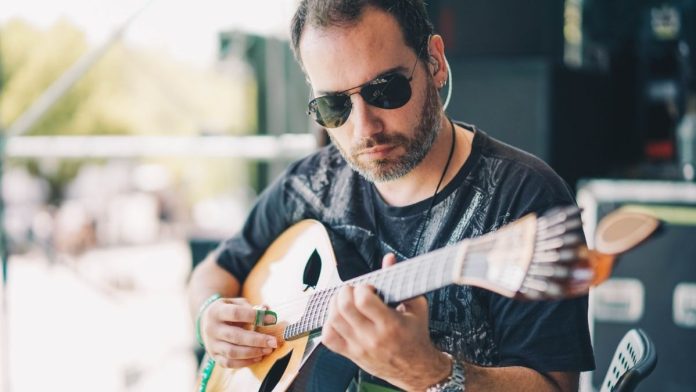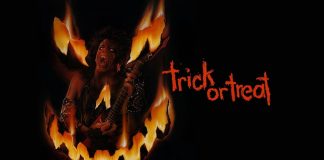Ricardo Gordo stands as an influential figure in reimagining the guitarra portuguesa (Portuguese guitar) for contemporary music. A master’s degree holder in Music Teaching with a specialisation in Portuguese Guitar, Gordo has charted an ambitious path towards new sonic territories and fresh applications of this traditionally revered instrument. Born in Portalegre in 1987, his career has been remarkably diverse, encompassing collaborations with prominent names such as Dulce Pontes, Stereossauro, and Beatbombers. The musician discussed his relationship with the Portuguese guitar and the instrument’s evolution within Portugal’s musical landscape.
Finding His Sound
“I started with the Portuguese guitar in 2009 when I had the opportunity to study with Custódio Castelo,” Gordo explains. “I applied for a degree in Portuguese guitar and completed my academic journey with a master’s in teaching. As an academic, it’s practically impossible to separate what you’re learning and teaching from your own performance. This continues to shape my technical evolution as a musician, regardless of the instrument. But I can say that whilst I began on the electric guitar at age ten, it’s with the Portuguese guitar that I discovered my voice. The purity of an acoustic instrument forces you to work on and seek out your own timbre. This ultimately improved my sound tremendously on the electric guitar as well.”
The Portuguese Guitar Beyond Fado
Whilst the Portuguese guitar remains frequently associated with fado, Gordo emphasises that the instrument’s trajectory shifted markedly when fado achieved UNESCO Intangible Cultural Heritage status. The guitarist points to his work with Stereossauro in electronic and hip-hop music as evidence of how the Portuguese guitar has found innovative applications beyond its traditional moorings.
“When fado became UNESCO heritage, there was an explosion of interest in the Portuguese guitar,” Gordo recalls. “I remember that year as a student – the Portuguese press visited our polytechnic repeatedly to interview us. There was a sudden surge of interest in the guitar, in fado, in the schools themselves. Mariza and Ana Moura were the new voices of fado, and suddenly it became fashionable. It became mainstream for roughly five years, which sparked the emergence of new fadistas and guitarrists. The Portuguese guitar also appeared in electronic music and hip-hop, and here I’m particularly proud, as I had the privilege of contributing to this facet of the instrument right from when I began recording with Stereossauro. After Bairro da Ponte in 2018, there was another surge in Portuguese guitar with beat-driven production. I should mention Moonspell with António Chainho in metal, Gaspar Varela with Madonna in American pop, and Ana Moura’s collaborations with Prince and the Rolling Stones. These were exceptional, albeit brief, opportunities to export the Portuguese guitar internationally.”
Technique and Approach
“I was taught traditional technique and it remains what I defend.”
Gordo remains a staunch advocate for traditional Portuguese guitar playing, asserting that “the guitar only sounds Portuguese when played with two fingernails – the index and thumb – on the right hand” and that “its sonority depends on the approach, and the characteristic tremolo only works this way.” At the same time, however, he explores contemporary effects such as reverbs and delays to lend a modern sensibility to the instrument’s voice.
“I was taught to use traditional technique and that’s what I defend. That said, I’ve always experimented with numerous effects like reverbs and delays so the guitar sounds more modern, closer to the music I actually enjoy listening to. But the fundamental technique must remain traditional.”
Evolution and the Future
“Culturally, fado is a niche that was only belatedly explored in pop, unlike how the Spanish approached flamenco.”
Gordo acknowledges that the Portuguese guitar’s evolution has proceeded more slowly than its Spanish counterpart, attributing this partly to Portugal’s smaller population, the relative scarcity of guitarists and luthiers, and the manner in which fado was eventually absorbed into popular music. He believes that guitarists’ technique and approach have evolved considerably, incorporating influences from diverse musical traditions.
“Various luthiers continue experimenting with new ideas to contribute meaningfully to the instrument’s development. In my humble opinion, and it’s only mine, the Portuguese guitar‘s evolution has been comparatively gradual when measured against the Spanish guitar. But we’re a smaller country with fewer guitarists and luthiers. Culturally, fado has remained something of a niche and was only belatedly exploited in pop, unlike how the Spanish handled flamenco. This is just one factor explaining why the Portuguese guitar has undergone relatively few alterations since the eighteenth century. What has actually evolved more is the technique and approach of the guitarists themselves, who from the 1990s onwards began incorporating influences from other musical styles – jazz, classical music – into their playing.”
Regarding his favourite compositions to perform, Gordo mentions his affection for pieces by the Paredes family and his own works, as both deeply reflect his emotions and life experiences. “The former because I consider them the most beautiful pieces ever written for this instrument, elevating it beautifully. My own because, plainly, they’re my emotions, my lived experiences, which I share as music.”
Carlos Paredes (1925–2004) was a virtuoso Portuguese guitar player and composer widely regarded as “The Master of the Portuguese Guitar” and “The Man with a Thousand Fingers” for his revolutionary technique. Born in Coimbra into a family with generations of guitar tradition, Paredes revolutionised the instrument by blending classical sophistication with innovation, taking it far beyond its traditional fado associations. His groundbreaking 1967 album Guitarra Portuguesa became a touchstone for the instrument’s evolution. A man of conviction, Paredes was imprisoned for 18 months during Portugal’s dictatorship for his involvement with the Communist Party. Though he worked most of his life as an archivist at a Lisbon hospital, his compositions and performances, including film soundtracks and international collaborations, established the Portuguese guitar as a symbol of Portugal’s musical identity.
“The twelve strings have always given me a sense of vulnerability for various reasons, not least because it represents my country.”
Gordo also reflects on the Portuguese guitar‘s capacity for storytelling and emotional transmission, though he feels considerably more at ease and better equipped with the electric instrument. “The electric guitar was my first instrument and remains my primary one. Although I’ve pursued a more extensive academic and artistic trajectory with the Portuguese guitar, it’s with the electric that I feel at home. I’ll admit I’m more comfortable and have a richer ‘vocabulary’ with six strings rather than twelve. The twelve strings have always sparked a certain vulnerability, partly because it’s the instrument that represents my country.”
“If there was scant space for Carlos Paredes, there won’t be much room for those who follow him.”
Looking ahead, Gordo observes that after its surge in popularity, the Portuguese guitar has gradually returned to more niche territory, though it remains emblematic of Portugal’s musical heritage. “As a teacher, I recognise how much less sought-after it is compared to a classical or piano. It’s still perceived as an instrument tied to tascas de fado – traditional fado venues – despite the fact that we now have some classical repertoire and numerous emerging guitarists producing genuinely interesting work. But our market is quite small, and if there was scant space for Carlos Paredes, there won’t be much room for those who follow him. Nevertheless, I believe our guitar will continue to add a touch of ‘Portugueseness’ to music, whatever the genre. As a musician, it heartens me to find people who enjoy listening to it, who seek it out, and who embrace its modernisation, recognising that evolution is necessary for its survival.”



